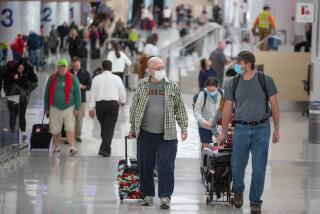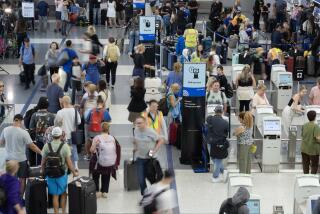50% of Its U.S. Flights Are Operating, Struck TWA Says
- Share via
NEW YORK — Trans World Airlines, struck by its 6,000 flight attendants, said it was able to operate half of its domestic flights Friday, the first day of the walkout, and that it hoped to be operating at 100% within a few days.
The airline, which is the nation’s fourth largest and carries more passengers across the North Atlantic than any other airline in the world, said it was able to continue almost all of its international operations.
Picket Lines Up
According to the Independent Federation of Flight Attendants, whose members went on strike early Friday, picket lines went up at airports in half of the 63 American cities served by TWA.
No talks were held Friday, but a federal mediator said in Washington that “we will definitely be getting the parties together again in the next few days.” He said he was not sure whether a negotiating meeting would be held this weekend.
TWA spokesmen said that about 1,500 substitute flight attendants had been trained in anticipation of a strike. Ticket agents and other non-union personnel also were reported to be taking over the jobs of the strikers.
Could Sell Airline
When flight attendants struck TWA for 45 days in 1973, the airline suspended operations. This time, however, the airline’s new board chairman, Carl C. Icahn, vowed to keep TWA’s planes flying unless members of other unions refused to cross the flight attendants’ picket lines. In addition, he raised the possibility, in that event, of dismantling the airline and selling off its parts.
Dozens of strikers braved subzero wind chill factors at New York’s airports carrying signs accusing the airline of “Bad Faith Bargaining” and “Operating With Scabs.” Other signs referred to Icahn’s suggestion that flight attendants--whose ranks are made up overwhelmingly of women--are not the primary source of income for their families and therefore should agree to make larger wage and benefits concessions than members of other unions.
One flight attendant picketing here wore a button reading: “I’m a breadwinner, not just a loaf.”
Pilots Criticized
At a Washington news conference, union President Vicki Frankovich vowed to continue the walkout “as long as it takes” and criticized the airline’s pilots for not supporting the strike.
“Our members are committed for the long haul,” she said. “We are going to put on the best fight we can.”
The Air Line Pilots Assn., which represents TWA’s pilots, signed a new contract with the airline earlier this year. The pact includes a no-strike clause, and the pilots continued to work aboard TWA planes Friday.
The airline’s machinists, on the other hand, have no such clause in their contract, and some refused to cross picket lines even though they had apparently not been ordered formally to do so by the leaders of their union, the International Assn. of Machinists and Aerospace Workers.
“Our position here at (Kansas City) international headquarters,” machinists’ union officer David Stack said in a telephone interview, “is that good trade unionists don’t cross legitimate picket lines. We don’t issue directives; our locals would support anyone who honors picket lines.”
Confusion Among Machinists
At John F. Kennedy Airport in New York, there was confusion among machinists about whether to support the flight attendants. One group of machinists showed up for work but expressed anger about the lack of guidance from their union. Eventually, they left the airport, most saying they were going home or to union headquarters.
“Personally, I think Mr. Icahn is asking way too much, and I think he’s not being fair,” said one machinist, who refused to be identified. He added that he had come to work thinking he would cross the picket lines but, on arriving, realized that “I just can’t do it. In my heart, I just can’t do it.”
A federal judge in Kansas City, where TWA has its major maintenance facility, denied the airline’s request for an order to keep the 10,000 members of the machinists’ union who work for TWA on the job.
At Los Angeles International Airport, about 30 flight attendants walked picket lines at TWA’s arrival and departure gates, hangar facilities and cargo offices, carrying signs that read, “Don’t Fly TWA” and “TWA Guilty of Bad Faith Bargaining.”
Wings Upside Down
Purser Celeste Coar, who wore the silver wings on her uniform jacket upside down “because I’m on strike,” said she is prepared to picket for “as long as it takes.”
TWA said it was canceling five of 17 domestic flights from Los Angeles on Friday. The one overseas flight, an evening non-stop to London, was expected to depart on schedule. A survey of passengers whose flights had been canceled indicated that none were experiencing difficulty in finding alternative flights.
Three of TWA’s four non-stop flights between New York’s Kennedy airport and Los Angeles International were canceled Friday. Also scrubbed were coast-to-coast flights from Washington and Philadelphia.
TWA has about 23% of the transcontinental market, making it third behind United Airlines, which has about 32%, and American, which has 30%. TWA carries an average of 46,000 passengers daily on 612 flights in 165 airplanes.
$35,000 a Year
Icahn told reporters in Washington on Friday that the airline had refused to bow in its talks with the flight attendants because “we did something we had to do . . . . We cannot exist when we’re paying the average flight attendant $35,000 a year--and about $50,000 with perks.” He vowed to make TWA, which lost $193 million last year and is expected to lose an additional $125 million in the first quarter of 1986, “a viable airline.”
Specifically at issue in the strike is how much in wage concessions the flight attendants would be willing to make and what work rule changes they will agree to. Talks between the two sides had been going on in Washington for about a week since a federally mandated 30-day cooling-off period expired, and they continued until Thursday’s midnight strike deadline.
The airline had demanded 22% pay cuts and the union offered to accept a 15% reduction.
After a particularly heated session Thursday night, the sides reportedly reached an impasse when Icahn reduced the wage savings he is demanding to $100 million from $110 million but refused to concede on the work rule issues, holding firm on his demand that flight attendants spend an additional two hours in the air each week.
The union said the demand would mean that its members would have to spend an additional eight to 10 unpaid hours a week away from home.
The union’s negotiators offered a new package of concessions by adding $20 million in “productivity increases” to their existing offer of $30 million in wage cuts.
More to Read
Sign up for Essential California
The most important California stories and recommendations in your inbox every morning.
You may occasionally receive promotional content from the Los Angeles Times.













